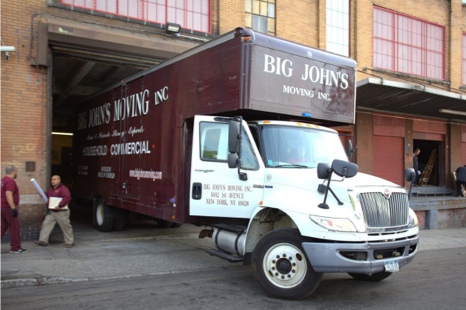
Whether relocating uptown, downtown or out of town, just the thought of
moving can bring the steeliest New Yorker to tears. Even more worrisome
than organizing the process is the thought of placing all of one’s worldly
goods into the hands of a truckload of burly strangers. The less-than-sterling
reputation of the moving industry doesn’t help, either. According to the
Better Business Bureau, moving companies consistently make the list of
the top 10 industries consumers complain about. Even moving companies
themselves admit that 3 in 10 moves result in a complaint against the mover.
While those odds don’t sound promising, there are several precautions you
can take to ensure that you are one of the satisied customers who end up
providing glowing references about your moving company to your friends—
and to The Franklin Report.
- Where Do I Start?
- On Cost
- Contracts, Insurance and Licenses
- Cost-Saving Moving Tips
Hundreds of moving companies occupy the Manhattan yellow pages. Your choice should be made by considering four factors: cost,
availability, reliability and reputation. Begin with an assessment of your needs. According to most movers, if you are one of the many
adherents of the Manhattan shoe-box lifestyle, you will probably need 15 to 20 boxes for all your possessions. A family of two adults and two
children will require approximately 120 to 200 boxes. Most companies will provide an informal verbal estimate based on your description of
items, number of rooms, the availability of elevators on both ends of move, etc. If you’re looking for a binding estimate, some movers will
provide one after surveying your property and assessing your needs for themselves. Be forewarned that in this industry, a binding estimate is
an elusive thing. Be prepared to consider any estimate a rough calculation rather than a binding agreement. In any event, be prepared with
the requisite information before you call movers for estimates. Keep in mind that some movers only perform in-town moves while others are
licensed to do countrywide and international moves as well.

Local moves are generally billed at an hourly rate, ranging anywhere from $80
per hour (a 1 on our cost scale) to $200 per hour (a 5 on our cost scale). This rate
generally includes a truck and the labor of three men. Usually, moving companies
will stipulate a minimum number of hours of moving time, and sometimes also
a minimum amount of travel time. You should plan to factor in a gratuity of at
least $5 per man per hour. Most movers will supply blankets and other padding
material at no extra cost, but anything additional—rope, boxes, packing material,
tape, bubble wrap, Styrofoam—will be supplied at a signiicant markup over retail.
So you’re better off buying your own packing materials ahead of time.
Weight-rated fees are usually used for long-distance moves. The charges are
based on the weight of the goods and the distance they are moved. The truck is
weighed before it is loaded with your household items and furniture, and then
again after. The difference between the two weights will determine how you are charged. Again, get the best estimate you can before the move, but realize that the actual cost will be calculated after all the goods are
loaded on the truck and weighed.
To keep the rate down, budget-minded consumers should consider packing their own books and clothes, but leave the packing of breakable
items to the movers. That way the cost of moving can be contained and yet the cost of breakage and any other kind of damage can be
absorbed by the moving company.
Summer is the most popular moving season. Not unnaturally, movers are generally over-extended during the summer months. The busiest
time of year is generally also the most expensive. Many movers will offer up to a 30 percent discount on moves after Labor Day. Some will
also charge less for weekday moves. However, these are options that movers don’t readily mention, so make sure to ask about them when
you’re getting an estimate.
As with most business relationships, ensure that you negotiate a binding written contract before you move. Most moving companies have a
standard contract form. If it doesn’t include every foreseeable detail of the move, insist on adding these details. As with any contract, be sure
to scrutinize it carefully before signing it. Ensure that any agreed-upon terms such as mileage, packing, standard charges, additional costs
and insurance are all included on the contract. If possible, attach a copy of the inventory to the contract as well. Retain a copy of the signed
contract well after delivery has been completed, to ensure that all of your possessions are delivered in the manner that the contract dictates.
Be aware that most standard contracts require that the movers be paid before they unload their truck at your new home.
For interstate moves, basic insurance usually provides 60¢ of coverage for each pound of goods transported (30¢ for local moves).
While there is usually no additional cost associated with this kind of coverage, you do need to sign an additional contract to activate it.
Unfortunately, the coverage itself is less than adequate: for instance, if your $500 television weighs 10 pounds, you can collect only $3. Several
other insurance plans are provided at additional cost, and protecting the value of the $500 television might require purchasing one of these
supplemental plans. Optional plans come at varying costs and provide different degrees of coverage. The New York State Department of
Consumer Affairs website (www.consumer.state.ny.us/claim/movers.htm) can provide you with greater insights about moving insurance.
In New York State, the Department of Transportation (DOT) grants movers’ licenses. This agency provides an important listing of guidelines
to follow when planning a move. Advice such as “Don’t believe that any
phone or written estimate given by a mover will be the actual cost of your
move” are offered on the DOT website (www.dot.state.ny.us) in the Motor
Carriers and Trucking section. This site also provides a phone number to
call to verify that a mover is licensed. Use this service, because you should
never hire an unlicensed moving company.
Moves across state lines are regulated by the Federal Motor Carrier
Safety Administration (FMCSA). This government agency has published
a document for consumers, “Your Rights and Responsibilities When You
Move,” which is available on their website (www.fmcsa.dot.gov; go to
the Facts and Figures section). Due to the intense demand for consumer
information and protection regarding interstate moves, the FMCSA
launched a consumer hotline and online complaint form in late 2000 (see
their website for details).

- Packing items yourself will save you a bundle. However, movers will only acquire liability for damage resulting from their packing, so limit
the do-it-yourself items to unbreakables such as books and clothes.
- Packing materials cost signiicantly more at the moving company, so if you’re doing your own packing, buy the materials at an ofice
products or packing products store.
- Insurance may seem like an expensive frill, but it can save you a lot of money in the event of damage. There are many types of coverage, so
check out all your options before investing in one.
- The time of year and/or week during which you move will affect the cost. Since movers are typically busiest on weekends and in the
summer, many of them will offer discounts on moves that take place during the week and between Labor Day and Memorial Day.